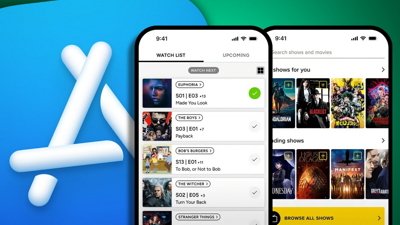As first reported at The Unofficial Apple Weblog, the App Store's new app rating system prevents developers from obtaining promotional codes for their applications. Such codes allow up to 50 free downloads for developers to distribute however they see fit, such as for publicity or promotion.
"As it stands, neither the 3.0 software nor iTunes display parental warnings when using a promo code to purchase apps with a mature (17+) rating," TUAW writes, "so Apple has made the promo code functionality unavailable for apps that fall into that category. We were informed of this condition by a developer who prefers to remain anonymous."
This has upset some developers, such as the creator of Instapaper and Tumblr, Marco Arment. The developer conveyed his frustration in a blog post Friday, saying he now doubts the viability of a business based on iPhone apps. Arment has expressed his displeasure with Apple before, specifically with regards to the iPhone maker's alleged unwillingness to answer developers' questions.
Now, Arment claims that Apple takes 8 to 30 days for review, and all Web-capable applications must come with nudity warnings.
"They’re making a killing taking their 30% commission on the 1.5 billion copies of $0.99 top-25 games that they’ve sold," he wrote. "Who cares if the App Store discourages good developers from putting serious effort into it? Apple doesn’t need to care. And, clearly, they don’t."
With iPhone OS 3.0, Apple added an age rating system for applications. This not only allows parents to set appropriate application access for their families, but also opens up the potential for developers to release applications with adult content.
Friday another developer also complained about the length of time in Apple's App Store approval process. Syncode, the developer behind the application iTweetReply, claims that Apple tested their application merely a few days after its submission to the App Store, but didn't provide a formal rejection until nearly a month later. The reason for the rejection: An illustration of an envelope displayed when the application launches included Apple's address, 1 Infinite Loop in Cupertino, Calif.
After the developer revised the application, it was approved two and a half weeks later.
"My personal guess is that once an app passes the initial technical test, it must be approved by multiple other levels from legal (to prevent illicit apps) to, well, God knows," Matthew Lesh of Syncode wrote. "If nothing else it has highlighted the need for a far more transparent approval process – Come on Apple, is it so hard to give us at least a quasi-detailed description of the approval process?"
 Katie Marsal
Katie Marsal













 William Gallagher
William Gallagher


 Christine McKee
Christine McKee
 AppleInsider Staff
AppleInsider Staff
 Chip Loder
Chip Loder

 Malcolm Owen
Malcolm Owen








56 Comments
In a future update, to separate the Safari/Browsing abilities from the App ratings altogether. You can already turn them off independently, but a .x update will need to allow developers to access these settings through an API and have the software be able to disable browsing features if the user has turned these off. This would allow the App to still be rated according to its unique content, and still protect the poor, innocent youth of America. That, or people could just could making frivolous lawsuits every time they feel the need to blame their parenting errs on corporations. Apple shouldn't be expected to risk their ass, or the livelihood of the App Store itself (especially in an age where we have an Internet "Czar") just because a few developers can't figure out how to lock their apps down, or don't see the potential hazard in not doing so. That being said, I do think my above solution would work, and would probably be as easy as several lines of code to implement into an App. Just my thoughts.
The app I'm finishing up right now is completely G rated. But because it uses a browser view to show its online help, it is going to be mature only? And I can't give promo codes to reviewers? I worked over six months coding this app!
I am not a developer but that does not stop me from having an opinion.
In my experience with all manner of sales, wherever there is a high level of heavy-handed regulation, there is a good reason behind it. If you consider the most regulated industries, you will discover some of the worst abuses of consumers. I suspect Apple is so inundated with obscene, pornographic, violent, and racist offerings, they have to regulate with a heavy hand. We only get one side of the story. We hear from disgruntled developers who feel cheated out of their piece of the app store pie. We never here from Apple, and so never get the whole story.
There are many developers who are writing apps that are on the fringe of acceptability. They are constantly pushing the envelop of what is acceptable. I do not feel sorry for them when their app that took all of ten minutes to make is declined. There is plenty of room in the fat middle for writing good apps that are useful and inoffensive to all. Apple is a family company and wants to run a family store. It is not always possible, and they do make allowances for people who are writing useless crap. Just brows through the store to see what I mean. But if they did not regulate with such a heavy hand, all you would ever find are baby shaking apps. Yes, Apple makes many mistakes in the process. I would rather they err on the side of caution, which they are doing most of the time.
As to apps with browsers, I can imagine that many developers are submitting apps that are fine on the surface, but link to inappropriate content in a browser. It is just a way for them to get around Apples rules and Apple is fighting back by overreacting with this new regulation. I am too familiar with human nature to be too upset with Apple over this one. Personally, I would prefer all of the fringe developers to go over to WinMo, Palm, or Google. The app store does not need to become a red-light district. If that means overenthusiastic policing from time to time, so be it.
the saga continues. Yawn.
Well, this might be a temporary thing. Whenever they get around to enable coupon redemption with rating warnings, the case should be solved? No idea what this browser-nonsense is about though. If somebody displays a help file or FAQ in a Mobile Safari control, the user has no means to navigate elsewhere. So, what's the big deal. Also: shouldn't the browser object added through Interface Builder honor the same parental control settings as Mobile Safari itself? If yes, then there is no issue. If no, go ahead and fix it.
As long as thousands of developers sign up for the program, and they can't barely keep up with submissions, they have absolutely no need to be more transparent about the approval logic. And seriously: putting anything in writing that can't be bypassed or turned upside down is about impossible. It would only make the situation worse for Apple, because then making exceptions to whatever they put in writing could open the door for claims.
On the other side, I can't really understand Apple's priorities in some cases. The German iTunes Store offered music by some neo-nazi bands for months. Some of them as explicit as celebrating 9/11 for the "extinction of Jewish and American scum" (and already blacklisted and declared illegal by German public offices). All this, of course, without even a rating or an "explicit" tag (no, I am not suggesting that would have made a difference). After the story hit major news sites, blogs and even the second biggest news show on German TV, they still needed almost two weeks to pull that crap.